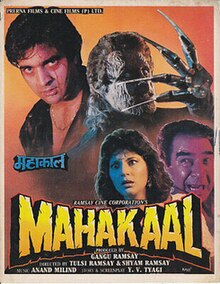|
Mahakaal (1994 film)
Mahakaal, also known as Mahakaal: The Monster, is a 1994 Indian Hindi-language horror film directed by Shyam Ramsay and Tulsi Ramsay, known as the Ramsay Brothers. The film borrows numerous elements from the 1984 American film A Nightmare on Elm Street and its sequels, including its antagonist, Shakaal—who, like Elm Street's Freddy Krueger, is a razor-gloved killer who can murder people through their dreams. Blending elements of mysticism, black magic and slapstick comedy,[3] Mahakaal is the second Bollywood film derived from A Nightmare on Elm Street, following 1989's Khooni Murda, which was produced by Mohan Bhakri.[4][5] Mahakaal was also the last horror film produced by Shyam and Tulsi Ramsay.[4] It was a moderate commercial success upon its theatrical release on 11 February 1994.[2] PlotA college student, Seema, has a nightmare that a horrible looking man wearing steel claw gloves and attacks her. She wakes up to find that she has real wounds on her arm. Later her friend Anita too has the same nightmare and finds real wounds on her arm. Anita tells her parents about her nightmare. Her father, who is a policeman, refuses to believe it. Later, Seema is attacked again in her dream and she dies of the wounds. Her boyfriend is put in police lockup where he sees the horrible man who makes snakes appear by magic. The boyfriend dies of snake-bite. Later, Anita and her mother catch Anita's father taking out a metal clawed glove from his drawer, so he is forced to reveal the secret that an evil magician Shakaal had been kidnapping children and sacrificing them to increase his evil powers. Seven years ago, Shakaal had killed Anita's sister too. Finally, Shakaal kidnaps Anita. As her father knows Shakaal's place, he arrives with Anita's boyfriend and they manage to kill him and save Anita.[6] Cast
Soundtrack
ReceptionBox officeMahakaal was not considered a commercial success.[4][5] Its lackluster box office performance has been attributed to an oversaturation of horror films in the Indian market by the end of the 1980s,[4][5] as well as to the economic and social reforms that had expanded the number of television channels available in India, allowing viewers the ability to watch such films as the American original, A Nightmare on Elm Street at home.[5] Critical responseIn 1997, British author Pete Tombs wrote that Mahakaal "was well made, very atmospheric and took few liberties with the original story."[4] References
External links
|
||||||||||||||||||||||||||||||||||||||||||||||
Portal di Ensiklopedia Dunia
